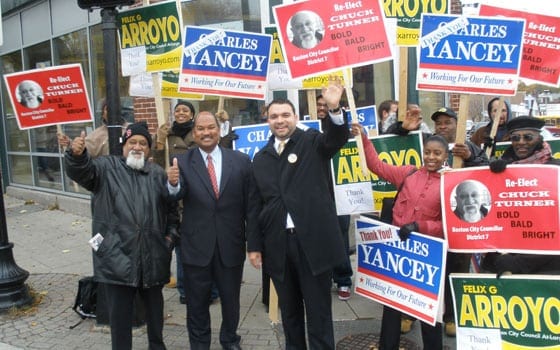

Author: Yawu MillerCity Councilors Chuck Turner (left) and Charles Yancey (center) celebrate Felix Arroyo’s (third from left) decisive victory in last week’s at-large city councilor race. The three also expressed their gratitude to voters while standing in Grove Hall last week.
The growing political influence of black, Latino and Asian voters was a decisive factor in the mayoral and at-large city council campaigns last week, contributing to Mayor Thomas Menino’s decisive victory over challenger Michael Flaherty.
Menino won big in the black community, garnering over 70 percent of the vote among the 10,000 voters who cast ballots in Mattapan. The 4,000-vote gap he opened up on Flaherty there alone was nearly a quarter of the 16,355 votes that separated him from Flaherty.
“It would have been very, very close without the black vote,” said MassVOTE Executive Director Avi Green.
The results from last week election show stark contrast between voting patterns in the predominantly black and Latino wards in Roxbury, Dorchester, Mattapan and Jamaica Plain and the more conservative white neighborhoods of South Boston, Charlestown and the south and eastern sections of Dorchester.
The most successful candidates were those able to dominate in either the Irish or black neighborhoods, while picking up modest votes outside.
At the top of the ballot, John Connolly topped the ballot in West Roxbury and came in second in South Boston and Charlestown, while picking up votes in Jamaica Plain, which has a base of Latino and progressive white voters.
Felix G. Arroyo, on the other hand, dominated in the Latino and black neighborhoods, but still came in fourth in West Roxbury and Charlestown.
By way of contrast, 5th-place finisher Tito Jackson won in the predominantly black wards 12 (Roxbury), 14 and 15 (Dorchester), but failed to penetrate the top four slots in any communities that were predominantly white.
For black, Latino and Asian candidates, the black community is a natural base of support, according to state Rep. Byron Rushing. Ignoring that base may have been what caused Tomas Gonzalez to finish seventh out of eight candidates in the at-large race, he said.
“You have to work for that base,” he commented, noting that mayoral candidate Sam Yoon made the same mistake in the preliminary. “A non-African American person cannot win without the support of the black community.”
In stark contrast, Menino worked the black community, kicking off his campaign in Dudley Square and featuring black elected officials prominently in his campaign events.
On the campaign trail, the influence of black, Latino and Asian voters was underscored by an increased number of candidate forums in those communities and the injection of racially-sensitive topics into the mayoral debate.
The increased debate got people talking, according to Michael Curry, who chairs the Political Action Committee of the NAACP Boston Branch.
“You had people in barber shops debating which candidates were the best for the community,” he said. “Average, everyday brothers and sisters. They were engaged because the candidates engaged the community.”
Curry credited MassVOTE organizer Cheryl Crawford, who organized four debates.
The debates gave Flaherty a forum to attack Menino on racially-charged issues, like the city’s lack of enforcement of the Boston Residents Jobs policy, which mandates that all major construction projects in the city hire 25 percent black and Latino workers.
But the endorsements of black pastors and the Massachusetts Association of Minority Law Enforcement Officers failed to convince black voters to vote for Flaherty.
Nor did the endorsement of Councilor Sam Yoon, who lost his bid for mayor in September’s preliminary election. In the black community, Yoon’s support seems to have switched to Menino in the final election, whereas some of Yoon’s white liberal support may have migrated to Flaherty.
While candidates for citywide elections cannot ignore the black community, seven members of the 13-member council are whites who have smaller percentages of blacks in their districts.
The success of Arroyo and the three black members of the council may depend largely on their ability to make alliance with at least three progressive white councilors to secure a majority.
The issues of jobs, education equity and affordable housing may likely surface over the next two years at City Hall. The councilors will also have to confront the 2010 Census and the job of re-drawing the lines of district council seats.







